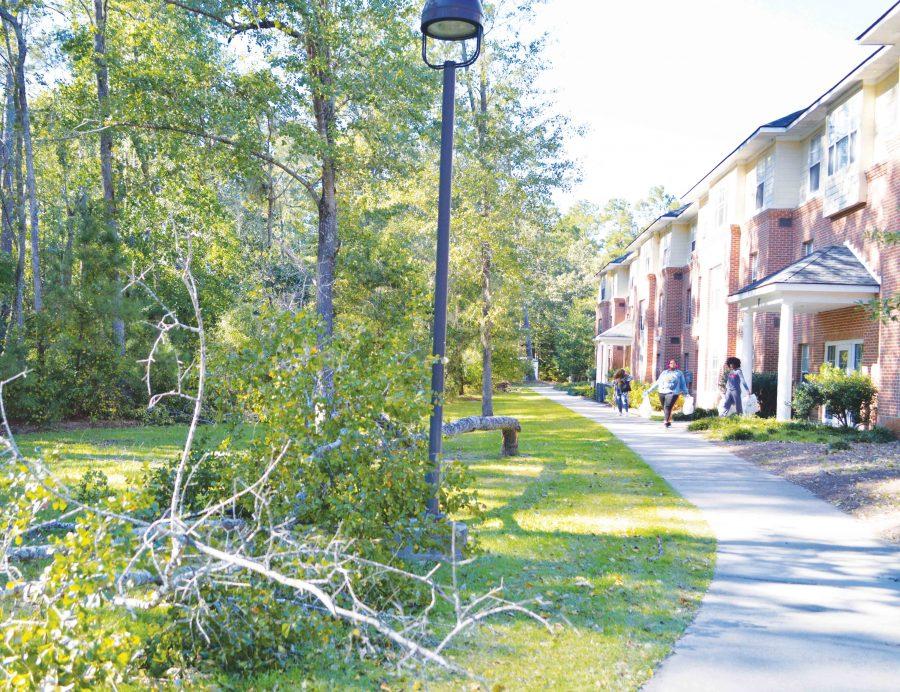FMU decides not to make up class days in wake of hurricane
Photo by: Lauren Owens
Trees fell across campus including this one in front of the Villa apartments where Dr. Jon Tuttle and housing director Cheryl Tuttle stayed during Hurricane Matthew.
FMU officials reported last week that students and faculty will not make up days of class missed due to Hurricane Matthew.
“It wasn’t necessary to add any extra days and that has been communicated to the faculty,” FMU Provost Dr. Peter King said. “The committee thought that adjustments could be made by individual faculty in their classes, and if necessary, technology could be used to add different material to classes.”
A committee, which consisted of faculty from various departments across campus, met on Oct. 17 to discuss how the university would handle missed classes and made the final decision to not add anymore days.
According to King, the committee thought that adding days to the year would disrupt plans that students could have already made to travel during fall break or Thanksgiving break.
King also said the university did not plan to miss as many days, but Gov. Nikki Haley’s declared state of emergency required coastal universities such as FMU, Coastal Carolina and College of Charleston to close.
In addition to missed classes, Hurricane Matthew brought downed trees, power outages and flooded apartments to FMU.
According to Tucker Mitchell, executive director of public and community affairs, approximately 40 trees fell across campus but caused no damage to university buildings.
Mitchell said that the university was lucky to not have any trees fall on buildings, but there were some close calls. One tree fell by The Grille, missing the back of the building by about a foot and brushing the wall of the building.
The concentration of the damage occurred around the Wallace House where FMU President Dr. Fred Carter lives, according to Mitchell.
The clean up efforts began the day after the storm, Sunday, Oct. 9. Three days after Hurricane Matthew, FMU received power back.
Mitchell said cleanup efforts are expected to finish within next week, and the university has minimal cleanup left.
During the storm, campus dining served food to students who stayed on campus.
“The cafeteria had ceiling tiles fall in and was getting some flooding, but they had food out, even though it was sometimes cold, like potato salad and sandwiches,” Director of the Honors Program and English Professor Dr. Jon Tuttle said. “They worked their butts off, and it was good.”
Tuttle and FMU Director of Residence Life Cheryl Tuttle stayed on campus in the Villas for the duration of the storm to assist with complications of the storm.
According to Cheryl Tuttle, fewer than 10 people were moved due to flooding caused by the storm.
Students who had flooding during the storm were given temporary housing until maintenance could come assess and clean the mess caused by the flooding.
Senior biology major Paul McCrae was out of town on a trip to Mississippi during the hurricane and came back to a flooded apartment.
“It was kind of frustrating,” McCrae said. “I wasn’t staying in Florence at the time. I didn’t know how bad it was.”
Housing gave McCrae the option of leaving his roommates to move in with other people, but he declined, choosing to moving back home for the remainder of the semester.
“This has severely put a kink in the flow of how the semester is going for me academically,” McCrae said. “It’s been an added stressor to an already stressful and highly weighted semester for me considering I’m graduating this fall.”
According to McCrae, the flooding in his apartment during Hurricane Matthew was not the first time his campus apartment has flooded.
For commuter students, the storm created issues in transportation to school when classes resumed on Thursday, Oct. 13.
According to junior Katelin Stalvey, a lot of the roads she takes to school were washed out, forcing her to take a detour to get to school each day.
“I can’t use the normal road to school, which took me only 45 minutes to get to school,” Stalvey said. “Now it takes me an extra 10 minutes to get to campus.”
The hurricane also caused extra stress for Stalvey to catch up on missed work because of the missed classes.
“I had to stay an extra 45 minutes in lab to make up work that was missed,” Stalvey said. “It’s been really stressful making up work, tests and papers all at once.”
